Unit 1 Where did you go on vacation
- 格式:doc
- 大小:150.50 KB
- 文档页数:24
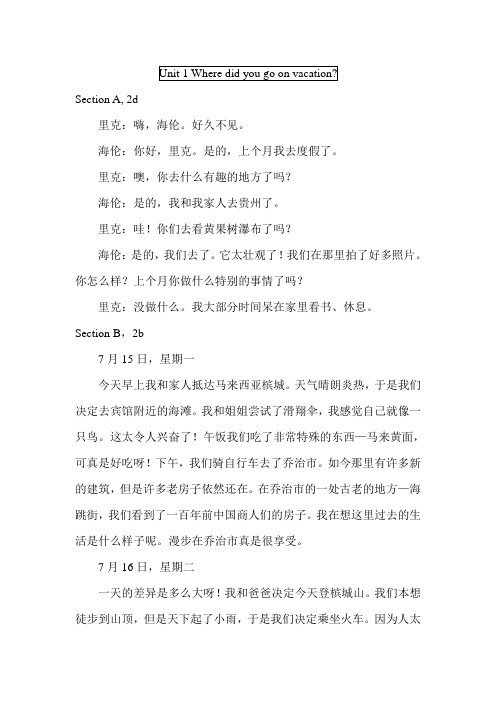
Section A, 2d
里克:嗨,海伦。
好久不见。
海伦:你好,里克。
是的,上个月我去度假了。
里克:噢,你去什么有趣的地方了吗?
海伦:是的,我和我家人去贵州了。
里克:哇!你们去看黄果树瀑布了吗?
海伦:是的,我们去了。
它太壮观了!我们在那里拍了好多照片。
你怎么样?上个月你做什么特别的事情了吗?
里克:没做什么。
我大部分时间呆在家里看书、休息。
Section B,2b
7月15日,星期一
今天早上我和家人抵达马来西亚槟城。
天气晴朗炎热,于是我们决定去宾馆附近的海滩。
我和姐姐尝试了滑翔伞,我感觉自己就像一只鸟。
这太令人兴奋了!午饭我们吃了非常特殊的东西—马来黄面,可真是好吃呀!下午,我们骑自行车去了乔治市。
如今那里有许多新的建筑,但是许多老房子依然还在。
在乔治市的一处古老的地方—海跳街,我们看到了一百年前中国商人们的房子。
我在想这里过去的生活是什么样子呢。
漫步在乔治市真是很享受。
7月16日,星期二
一天的差异是多么大呀!我和爸爸决定今天登槟城山。
我们本想徒步到山顶,但是天下起了小雨,于是我们决定乘坐火车。
因为人太
多,我们等了一个多小时的火车。
当我们到达山顶的时候,雨下得真大。
我们没有带雨伞,结果我们(被淋得)又湿又冷,真是糟透了!并且因为糟糕的天气,底下的东西我们什么都看不到。
爸爸没有带足够的钱,所以我们只吃了一碗米饭和鱼。
因为我太饿了,饭的味道尝起来还真是不错!。

Unit 1 Where did you go on vacation ?课文重难点讲解【教师寄语】The reason why a great man is great is that he resolves to be a great man.伟人之所以伟大,是因为他立志要成为伟大的人Section A1. Where did you go on vacation ? 你去哪儿度假?【解析】vacation [və'keɪʃn] n假期= holidayon vacation 在度假take a vacation 去度假winter vacation 寒假summer vacation 暑假①I have a lot of _______________every year . (vacation)( ) ②—Where did Sarah go on vacation? —She went to America.A. on vacationB. take a vacationC. is on vacationD. is for vacation2. Kevin meet anyone interesting?凯文遇到有趣的人了吗?【解析1】someone [sʌmwʌn] pron 某人anyone [eniwʌn] pron任何人everyone [evriwʌn] pron每人,人人【注】不定代词作主语,谓语动词用单数Is everyone here ?Did she go to the park with __________last year? ( someone)【解析2】interest v 使感兴趣→interesting adj. 有兴趣的→interested adj. 感兴趣的be interested in 对……感兴趣The students are __________in these ______books.( interest)【注】以—ing结尾的adj. 常用来作定语或表语,修饰物。


Unit 1 Where did you go on vacation?(一)重点短语Section A 1a-1c1.go on vacation\holiday去度假2.stay at home待在家里3.go to summer camp去(参)加夏令营4.go to the mountains去爬山5.go to the beach去海滩Section A 2a-2d1.go with sb.和某人去2.buy anything special购买任何特别的东西3.play volleyball打排球4.study for tests\exams备考,为考试而学习5.go out with sb.和某人出去6.Long time no see.=I haven’t seen you for ages.好久不见。
7.on vacation=on holiday在度假8.Huangguoshu Waterfall黄果树瀑布9.quite a few+复数名词,许多,相当多10.What about you? =How about you?那你呢?st month上个月12.Not really.没什么,没做什么。
13.most of the time大多数时候14.a few 一些,少数,几个Section A Grammar focus (3a-3c)1.no one=nobody没有人,没人2.buy sth. for sb.为某人买东西3.have a good time =have a wonderful time =have a great time =have a good day=have fun=enjoy oneself过得愉快,玩得开心4.go to Sanya去三亚5.How did you like it?=What did you think of it?你觉得怎么样?6.first time第一次7.go shopping=do some shopping去购物8.of course=certainly=sure当然9.buy sth. for oneself为自己买东西10.in the family在家里11.in the countryside在乡下,在农村12.the only problem唯一的问题13.bye for now就此别过,该说再见啦14.at a restaurant在一家饭店15.keep a diary写日记16.Hong Kong香港Section B 1a-1e1.best friend最好的朋友,好朋友2.fun park游乐场,娱乐公园Section B 2a-2b1.what activities什么活动2.arrive in到达大地点3.arrive at到大小地点4.get to到达5.this morning这天早上,今天早上6.try paragliding尝试滑翔伞运动,尝试跳伞活动7.feel like感觉,觉得8.Malaysian yellow noodles马来西亚黄面条9.ride bicycle to+地点,骑自行车到某地10.a lot of=lots of=many/much许多11.new buildings新的建筑物(楼房)12.many of...许多......13.the house of......的房子14.Chinese trader中国商人15.from 100 years ago 从100年以前16.in the past在过去17.walk around the town=walk all over the town在小镇上四处走走18.go to Penang Hill去槟城山19.walk up to徒步走到20.a little一点,一些21.take the train乘火车22.wait for等候,等待23.too many people许多人,太多人24.too many许多,太多(修饰复数名词)25.get to the top到达山顶26.because of因为,由于27.28.have one bowl of rice吃一碗米饭29.taste great吃起来很美味Section B 2c-2est week上周,上个星期2.go paragliding去跳伞3.on the beach在海滩上4.wait a long time for等了很长时间5.bring an umbrella带伞,带雨伞6.the next day第二天7.That’s not all.那还不算,那不是全部,不止这些。
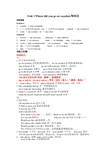
Unit 1 Where did you go on vacation知识点词型转换Section A1.wonder →(adj.) wonderful2.I →(反身代词) myself you →(反身代词) yourself yourself →(pl.) yourselves3.seem →(pt.) seemed try →(pt.) triedSection B1.activity →(pl.) activities difference →(adj.) different2.decide →(n.) decision build →(n.) building trade →(n.) trader3.excite→(adj.) exciting/excited →(n.) excitement enjoy→(adj.)enjoyable4.like →(反义词) dislike below →(反义词) above5.bike →(同义词) bicycle词组大归纳Section A1a1.关于活动的词组:go on vacation去度假(强调动作) be on vacation在度假(强调状态)stay at home在家go out with someone 和某人一起出去go to mountains去爬山go to New York City 去纽约城go to the beach去沙滩go to summer camp 去夏令营visit relatives 拜访亲属visit museums 参观博物馆visit还可以作名词“拜访,参观”,构成短语pay a visit to…/be on a visit to…译为“访问(某人)”“参观(某地)”1.keep a diary 写日记play volleyball 打排球of course 当然;自然1. buy something special 买一些特别的东西meet someone interesting 遇见有趣的人2. study for a test/tests 备考study to do sth学习做某事study by oneself =learn by oneself= teach oneself自学2d1.交际用语:1)Long time no see.好久不见2) Nice to meet you.很高兴见到你3) Excuse me.劳驾4)表示建议的几种:How about doing sth?……如何?Shall we do sth?我们能….吗?Let’s do sth.咱们去…. why not +do sth?为什么不做……?Would you like sth?你想要….吗Yes, please./No, thanks.是的,来一点/不,谢谢Would you like to do sth?你想要做…..吗?Yes, I’d love to./ I’d love to, but….是的我愿意/我愿意,但……2. last month 上个月last year 去年next month 下个月next year 明年句中有last+名词出现时用一般过去式,有next +名词出现时用一般将来时。

U nit1 Where did you go on vacation?Activities:(写出动词过去式)go on vacation去度假be on vacation 度假stay at home待在家里go to the mountains去爬山go to the beach去海滩visit museums 参观博物馆go to summer camp去参观夏令营quite a few相当多study for为……而学习go out出去most of the time大部分时间taste good尝起来很好吃have a good time玩得高兴of course当然feel like给……的感觉;感受到feel like doing sthgo shopping去购物in the past在过去walk around四处走走because of因为one bowl of…一碗……the next day第二天drink tea喝茶find out找出;查明go on继续take photos照相something important重要的事up and down上上下下come up出来不定代词有all, each, both, either, neither, one, none, little, few, many, much, other, another, some, any, no, (a) few, (a) little, both, enough, every 等,以及由some, any, no 和every 构成的合成代词(即somebody, anyone, nothing 等)。
在这些不定代词中,多数都能作主语、宾语、表语或定语,但是代词none 以及由some, any, no 和every 构成的合成代词只能作主语、宾语或表语,不能作定语,而no 和every 则只用作定语。
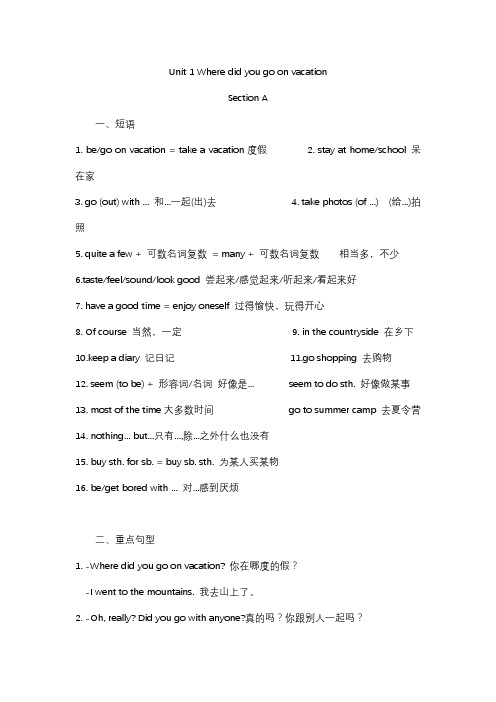
Unit 1 Where did you go on vacationSection A一、短语1. be/go on vacation = take a vacation度假2. stay at home/school 呆在家3. go (out) with ... 和...一起(出)去4. take photos (of ...) (给...)拍照5. quite a few + 可数名词复数= many + 可数名词复数相当多,不少6.taste/feel/sound/look good 尝起来/感觉起来/听起来/看起来好7. have a good time = enjoy oneself 过得愉快,玩得开心8. Of course 当然,一定9. in the countryside 在乡下10.keep a diary 记日记11.go shopping 去购物12. seem (to be) + 形容词/名词好像是... seem to do sth. 好像做某事13. most of the time大多数时间go to summer camp 去夏令营14. nothing... but...只有...,除...之外什么也没有15. buy sth. for sb. = buy sb. sth. 为某人买某物16. be/get bored with ... 对...感到厌烦二、重点句型1. -Where did you go on vacation? 你在哪度的假?-I went to the mountains. 我去山上了。
2. -Oh, really? Did you go with anyone?真的吗?你跟别人一起吗?-Yes, I went with my mother. 是的,我跟我妈妈一起。
3. Long time no see. 好久不见。
4. Did you do anything special last month?你上个月做什么特别的事情了?5. I just stayed at home most of the time to read and relax. 我大部分时间只是待在家里看书和放松。

人教版英语八年级上册Unit 1 Where did you go onvacation?教材全解及单元测试卷【教材内容解析】Section A1.Where did you go on vacation? (P. 1)on vacation意为“在度假”,结构“on+名词”表示“在某种状态中”。
My family went to Hainan on vacation last year.2....visited my uncle (P. 1)visit此处用作及物动词,后接人或物做宾语,意为“拜访、看望”,后接表示地点的名词,意为“参观、游览”。
I visited my grandmother last week.Do you want to visit Shanghai?3....go with anyone? (P. 2)(1)anyone用作不定代词,意为“有人、任何人”,相当于anybody,用于疑问句和否定句中,在肯定句中用someone或者somebody。
但是anyone也可以用在肯定句中,表示“任何一个人”。
Did you meet anyone friendly in that city?Anyone can be helpful in some way.(2)anyone只能指人,不可以指物,后面不接of短语;any one既可以指人也可以指物,后可接of短语。
Anyone in my class knows any one of the singers and any one of their sons.4....buy anything special? (P. 2)(1)buy用作双宾语动词,表示“买”,常用的结构为“buy sb. sth.”或者“buy sth. for sb.”,表示“为某人买某物”。
My father bought me a bike.=My father bought a bike for me.【拓展】可接双宾语的动词还有give, bring, show, tell, sell等。


Unit1 Where did you go on vacation?1.Where did you go on vacation? 这是一个一般过去时的特殊疑问句,其句式结构为“特殊疑问句+一般疑问句”其中where在句中作状语Where are you from?Iam from Xiamen.常见的疑问句词有what, who, whose, which, when, where, how, what time, what color, how much, how many等。
当特殊疑问句作主语时,句子的语序与陈述句的语序相同。
当特殊疑问句作句子的宾语,状语时,应用疑问词+一般疑问句的语序Who will give us a talk?(做主语)When do you get up every day?(时间状语)On vacation在假期中强调正在度假或休假The Smiths are on vacation.2.I went to the mountains.Go to+地点表示去。
Go to the beach, go to summer camp, go to Beijing2.过去式和动词原形一样的词有:Hurt, cost, let, put, cut, read3.原形以ow/aw结尾,过去式变为ew结尾Know-knew, grow-grew, draw-drew, throw-threw4.将动词原形中的I 改为O,变为过去式的动词Ride-rode, drive-drove, write-wrote5. 将动词原形中的I 改为a,变为过去式的动词swim-swam, give-gave drink-drank, ring-rang, begin-began, sing-sang6过去式以ought或aught结尾的动词Think-thought, buy-bought, bring-brought, fight-fought, teach-taught, catch-caught7.有些以eep或-end结尾的动词,过去式要改为ept或-entKeep-kept, sweep-swept, sleep-slept,lend-lent,spend-spent, send-sent8.Did you go with anyone?你和别人一起去的吗?这是实义动词过去时态的一般疑问句。

Unit1 Where did you go on vacation?一、单词(标注二音节重读的单词)1.pron.任何人2.adv.任何地方n.任何(一个)地方3.adj.精彩的;极好的4.adj.很少的;n.少量5.adj.最多的;大多数的;6.pron.某事物;7.pron.没有什么n.没有8.pron.我自己9.pron.每人;人人10.pron.你自己;你亲自11.n.母鸡;雌禽12.adj.无聊的;厌烦的;郁闷的13.n.猪14.n.日记;日记簿(keep a diary)15.vi.似乎;好像16.pron.某人;有人17.相当多;不少(后接可数名词)18.当然19.n.活动;活跃20.v.决定;选定(decide to do sth.)21.v.尝试;设法;努力(try to do sth. /try doing sth.)22.n.鸟;禽23.n.空中滑翔跳伞24.n.自行车25.n.建筑物26.n.商人;商船27.v.惊奇;想知道;怀疑28.n.差异;不同29.n.顶部;顶30.v.等;等待(wait for)31.n.伞;雨伞32.adj.湿的;雨天的33.prep.低于;在... 下面adv.在下面;34.conj. 如同,像... 一样35.adj.足够的adv.足够地;充分地36.n.鸭肉;鸭37.(反full) adj.饥饿的;渴望的38.想要39.v.不喜欢;厌恶n.不喜爱;厌恶;反感40.因为;由于41.玩得痛快二、短语42.去度假(vacation相当于holiday,但vacation表示长的假期。
)43.待在家里44.去爬山45.去海滩46.参观博物馆47.去参观夏令营48.相当多+可数名词复数49.为……而学习50.出去51.大部分时间52.尝起来很好吃:= (后接+ ) 53.玩得高兴54.当然55.给……的感觉;感受到:(后接+ )56.去购物57.在过去58.四处走走59.一碗…… 60.喝茶61.找出;查明62.继续63.去旅行64.照相65.上上下下66.出来;出版三、重点句式1.你买特别的东西了吗?Did you buy ?2.所有的东西尝起来真的很好吃!Everything tasted !3.你去哪里度假了?4.我为爸爸买了一些东西。
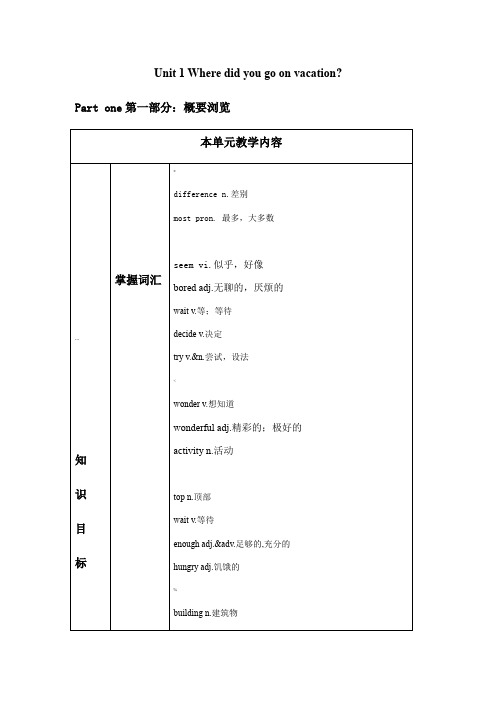
Unit 1 Where did you go on vacation? Part one第一部分:概要浏览)Part two 第二部分;知识点详解单词与短语讲解(一)quite a few的用法a few 意为“一些,若干(=some)”,后跟可数名词复数形式。
quite a few 意为“相当多;不少(=many)”后跟可数名词复数形式。
We took ____ ____ _____ _____ in the park last weekend.上周末,我们在公园里拍了相当多的照片。
【拓展】:few/a few/quite a few/little/a little/quite a little的用法1.most + 名词泛指多数,无范围most students大部分学生2.most + of + the (this/that/those/these等)+名词,指某一范围内的多数。
______ _____ _______students go to school by bike.这些学生们中的多数骑自行车去上学。
;(三)seem的用法seem“好像”,既可以后跟___________,又可以后跟___________。
【活学活用】1.The pig seems ___________(healthy/ healthily).2.Tom seemed ___________(know/ to know) the test result.3.I seem__________(have)a cold【拓展】(1.It seems+that从句看起来好像…;似乎….It seems that he is happy.=He seems _____ _____ happy. 他似乎很快乐。
2.seem like….好像,似乎…..It seems like a good idea.它似乎好像一个好主意。

Unit 1 Where did you go on vacation 重点语法:一,一般过去时用法:表示过去某时发生的动作或状态。
以句中表示过去的时间状语作为标记词。
例如:构成:谓语动词用过去式。
Eg:He went to the beach yesterday。
否定句:一般疑问句:特殊疑问句:动词过去式变形:规则变化练习:1,用所给词的适当形式填空1. We_________(play)basketball yesterday afternoon.2. My uncle_________(live) in Beijing in 2000.3. They_______(plan)to build a new bridge last year.4. I _______(study) for a test last night.5. Lily’s father_______(work)in the office two years ago.,2,句型转换,1,I was late for school yesterday.(改成否定句)2,His father had lunch in his factory.(改成一般疑问句)3,They went to the mountains on vacation.(改成否定句)4,Ann put her book in the desk just now.(划线部分提问)3,单项选择( )1. ---________did you go on vacation---Hong Kong.A. WhatB. HowC. WhereD. When( )2. I_____my homework last night. I went to the cinema with my parents.A. didB. didn’tC. didn’t doD. don’t do( )3. ---Did they clean the house yesterday afternoon---_________. They cleaned it this morning.A. No, they don’tB. Yes, they didC. No, they didn’t C. Yes, they do( )4. ---_____Tom and Jim_____a walk yesterday evening---No, they____.A. Do; take; doesn’tB. Did; take; didn’tC. Did; take; didD. Do; take; don’t ( )5. ---The coat looks good on you. Where______you______it---In a supermarket.A. do; buyB. did; buyC. will; buyD. does; buy二、复合不定代词Did you go with anyone Did you find anything special用法:1,作主语时,谓语动词用单数Everone (be)here.2, 被形容词修饰时,形容词必需后置。
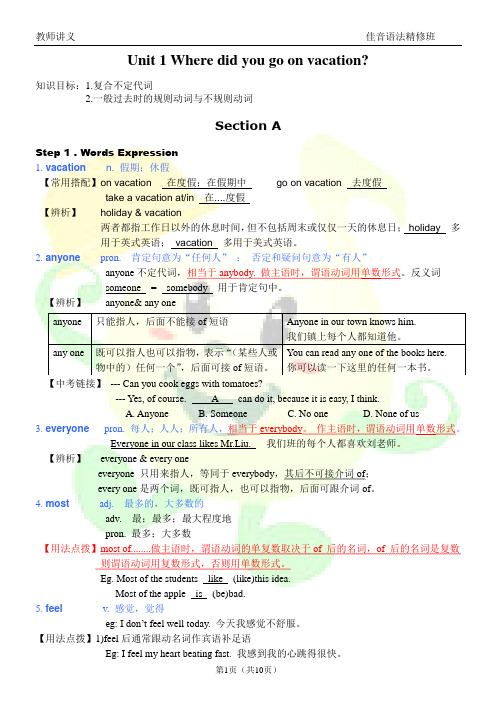
Unit 1 Where did you go on vacation?知识目标:1.复合不定代词2.一般过去时的规则动词与不规则动词Section AStep 1 . Words Expression1. vacation n. 假期;休假【常用搭配】on vacation 在度假;在假期中go on vacation 去度假take a vacation at/in 在....度假【辨析】holiday & vacation两者都指工作日以外的休息时间,但不包括周末或仅仅一天的休息日;holiday 多用于英式英语;vacation 多用于美式英语。
2. anyone pron. 肯定句意为“任何人”;否定和疑问句意为“有人”anyone不定代词,相当于anybody. 做主语时,谓语动词用单数形式。
反义词someone = somebody 用于肯定句中。
【辨析】anyone& any one【中考链接】--- Can you cook eggs with tomatoes?--- Yes, of course. A can do it, because it is easy, I think.A. AnyoneB. SomeoneC. No oneD. None of us3. everyone pron. 每人;人人;所有人,相当于everybody。
作主语时,谓语动词用单数形式。
Everyone in our class likes Mr.Liu. 我们班的每个人都喜欢刘老师。
【辨析】everyone & every oneeveryone 只用来指人,等同于everybody,其后不可接介词of;every one是两个词,既可指人,也可以指物,后面可跟介词of。
4. most adj. 最多的,大多数的adv. 最;最多;最大程度地pron. 最多;大多数【用法点拨】most of........做主语时,谓语动词的单复数取决于of 后的名词,of 后的名词是复数则谓语动词用复数形式,否则用单数形式。

U2 Where did you go on vacation?Important phrases: (重点短语)1.去夏令营2.买一些特别的东西3.为考试准备4.跟某人外出5.去纽约市6.好久不见7.度假8.去某个有趣的地方9.大多数时间10.给母鸡喂食11.除—外一无所有12.当然,自然13.似乎有点无聊14记日记15.令人愉快地活动16.到达17.决定去海边18.尝试滑翔伞运动19.感觉像一只小鸟20.想要骑车21.中国商人的房子22.在过去23许多古老的建筑24步行到山顶25.开始下雨26.等了一个多小时的火车27.下大雨28.忘记带一把雨伞29.又湿又冷30.因为恶劣的天气31.带着足够的钱32.足够大33.好像有点饿34.与—一样好35 不如----好36.照了相当多的相片37.停下来喝水38.继续前进39.激动地跳跃40.二十分钟后41.如此---以至于42.升起43.发现--44.尝起来很好吃45.尽力去做某事46.停止做某事47.不喜欢做某事48.继续做某事49.一碗米饭50为某人买某物重点句子1where did you go on vacation?go on vacation 去度假2.Visited my uncle重点:visit为及物动词,“拜访,探望,参观,游览”后接人或地点改错Did you visit in china?3. Did you buy anything special?1)buy 的过去式为boughtbuy sth.for sb.=buy sb sth.我为Tom买了一个礼物2)anything 不定代词“某物,某事”主要用于疑问句和否定句中一旦anything用于可定句中,则意为“任何事,任何东西”Eg You can ask me anything you want to know3)★形容词修饰不定代词要后置4.Oh,did you go anything interesting?这是一般过去时中不含was/were的句子在变一般疑问句时,需用助动词did。

Unit 1 Where did you go on vacation?重点单词及短语:Section A1. wonder → (adj.) wonderful2. I → (反身代词) myself3. you → (反身代词) yourself4. yourself → (pl.) yourselves5. seem → (pt.) seemedSection B1. activity → (pl.) activities2. decide → (n.) decision3. t ry → (pt.) tried4. bike → (同义词) bicycle5. build → (n.) building6. difference → (adj.) different7. like → (反义词) dislike8. below → (反义词) above重点短语:Section A1. go to Central Park 去中央公园2. on vacation 在度假3. buy something special 买特别的东西4. meet someone interesing 遇见有趣的人5. go out with someone 和某人一起出去6. take quite a few photos 拍相当多的照片7. most of the time 大多数时间8. go shopping 去购物9. keep a diary 记日记10. of course 当然;自然Section B1. have a good time 玩得高兴;过得愉快2. go to the beach 去海滩3. feel like 感觉像4. the houses of the Chinese traders 中国商人的房子5. a lot of new buildings 许多新的建筑物6. in the past 在过去7. over an hour 一个多小时8. too many people 太多的人9. get to the top 到达顶部10. because of the bad weather 因为不好的天气11. one bowl of fish 一碗鱼肉12. another two hours 另外两个小时13. the top of the hill 山顶14. learn something important 学习重要的东西Self Check1. go to the countryside 去乡下2. in the shopping center 在购物中心3. have a fun time 玩得高兴;过得愉快4. after three hours 三个小时以后5. keep going 一直走6. twenty minutes later 20分钟后重点句子:1. Where did you go on vacation?你去哪儿度假的?2. Long time no see.好久不见。
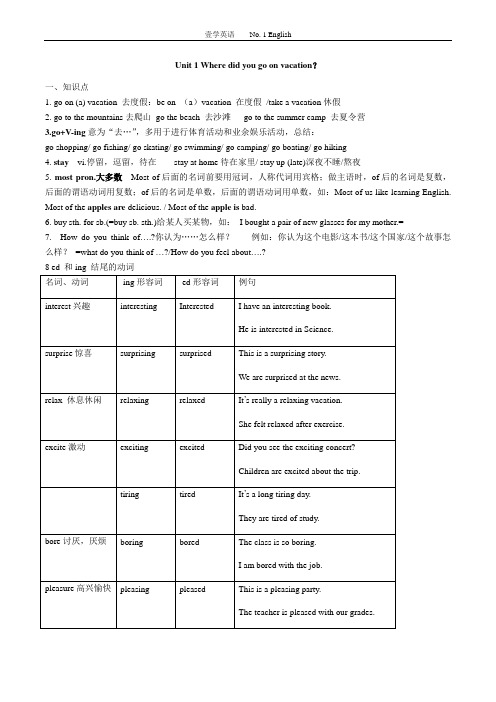
Unit 1 Where did you go on vacation?一、知识点1. go on (a) vacation 去度假:be on (a)vacation 在度假/take a vacation休假2. go to the mountains去爬山go the beach 去沙滩go to the summer camp 去夏令营3.go+V-ing意为“去…”,多用于进行体育活动和业余娱乐活动,总结:go shopping/ go fishing/ go skating/ go swimming/ go camping/ go boating/ go hiking4. stay vi.停留,逗留,待在stay at home待在家里/ stay up (late)深夜不睡/熬夜5. most pron.大多数Most of后面的名词前要用冠词,人称代词用宾格;做主语时,of后的名词是复数,后面的谓语动词用复数;of后的名词是单数,后面的谓语动词用单数,如:Most of us like learning English. Most of the apples are delicious. / Most of the apple is bad.6. buy sth. for sb.(=buy sb. sth.)给某人买某物,如:I bought a pair of new glasses for my mother.=7. How do you think of….?你认为……怎么样?例如:你认为这个电影/这本书/这个国家/这个故事怎么样?=what do you think of …?/How do you feel about….?8 ed 和ing 结尾的动词9. seem好像,似乎,看起来①主语+seem to do sth. Your father seems to like playing tennis very much.(变否定句)②主语+seem (to be)+adj. The classroom seems (to be) very clean.③It seems +that从句It seems that it will snow soon./ It seems that you are not happy today.10. problem大的问题,难题,需要用行动解决;question因疑惑而提出的,需要口头回答。

Unit 1 Where did you go on vacation?1、be on vacation在度假go on vacation去度假Where did you go on vacation?你去哪里度假?Where were you on vacation?你在哪里度假?2、visit用法visit+人:拜访某人,看望某人visit+地方:参观某地I visited my grandparents last week.上周我去看了我的爷爷奶奶。
She visited the Palace Museum last year.她去年参观了故宫博物馆。
3、去某地、到达某地的表达方式:go to +地方:去某地get to +地方:到达某地arrive in+大地方arrive at+小地方reach+地方go to New York City去纽约I got to Malaysia yesterday.我昨天到达马来西亚。
I arrived in Beijing the day before yesterday.我前天到达了北京。
注意:go home/here/there回家/去这里/去那里get home/here/there到家/到这里/到那里arrive home/here/there到家/到这里/到那里(home/here/there是副词,要去掉to)4、buy +人+物= buy +物for +人:给某人买某物I bought a gift for my sister.=I bought my sister a gift.我给我姐姐买了一个礼物。
5、玩得开心:have fun=have a good/great time=enjoy oneselfhave fun+动词ing形式have a good/great time+动词ing形式Did everyone have a good time?每个人都玩得开心吗?We enjoyed ourselves on the beach.我们在沙滩上玩得很开心。
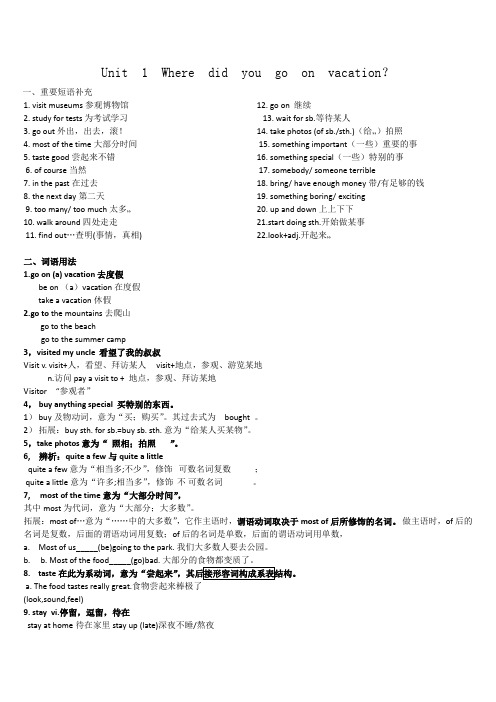
Unit 1 Where did you go on vacation?一、重要短语补充1. visit museums参观博物馆2. study for tests 为考试学习3. go out 外出,出去,滚!4. most of the time大部分时间5. taste good 尝起来不错6. of course当然7. in the past在过去8. the next day第二天9. too many/ too much太多…10. walk around四处走走11. find out…查明(事情,真相) 12. go on 继续13. wait for sb.等待某人14. take photos (of sb./sth.)(给…)拍照15. something important(一些)重要的事16. something special(一些)特别的事17. somebody/ someone terrible18. bring/ have enough money带/有足够的钱19. something boring/ exciting20. up and down上上下下21.start doing sth.开始做某事22.look+adj.开起来…二、词语用法1.go on (a) vacation 去度假be on (a)vacation 在度假take a vacation休假2.go to the mountains去爬山go to the beachgo to the summer camp3,visited my uncle 看望了我的叔叔Visit v. visit+人,看望、拜访某人 visit+地点,参观、游览某地n.访问 pay a visit to + 地点,参观、拜访某地Visitor “参观者”4, buy anything special 买特别的东西。
Unit 1 Where did you go on vacation?Part 1 TextbookPassage 1I (到达)Penang in Malaysia (今天早上和我的家人). It was sunny and hot, (所以我们决定去旅馆附近的沙滩). My sister and I tried paragliding. (我感觉像一只鸟). It was so exciting! For lunch, we (吃了一些非常特别的东西) Malaysian yellow noodles. They were delicious! In the afternoon, we (骑车去)Georgetown. There are a lot of buildings now, but (许多古老的建筑任然在那里). In Weld Quay, a really old place in Georgetown,(我们看见了100多年前中国商人的房子).(我想知道过去这儿的生活像什么). I really enjoyed walking around the town.Passage 2(一天的差别是多么大啊) My father and I decided to go to Penang Hill today. (我们想走到山顶), but then it started raining a little, so we decided to take the train. We (等了一个多小时打的火车)because there were too many people. When we got to the top, it was raining really hard. We didn’t have an umbrella (所以我们又冷又湿). It was terrible! And because of the bad weather, (我们看不见下面任何东西). My father didn’t bring enough money, so we only had one bowl of rice and some fish. The food tasted great because I was so hungry!Part 2 Words and Phrases一、把下面的短语翻译成英文1. 去夏令营2. 买一些特别的东西3. 为考试准备4. 跟某人外出5. 去纽约市6. 好久不见7. 度假8. 去某个有趣的地方9. 大多数时间10. 给母鸡喂食11. 除—外一无所有12. 当然,自然13. 似乎有点无聊14. 记日记15. 令人愉快地活动16. 到达17. 决定去海边18. 尝试滑翔伞运动19. 感觉像一只小鸟20. 想要骑车21. 中国商人的房子22. 在过去23. 许多古老的建筑24. 步行到山顶25. 开始下雨26. 等了一个多小时的火车27. 下大雨28. 忘记带一把雨伞29. 又湿又冷30. 因为恶劣的天气31. 带着足够的钱32. 足够大33. 好像有点饿34. 与—一样好35. 不如----好36. 照了相当多的相片37. 停下来喝水38. 继续前进39. 激动地跳跃40. 二十分钟后41. 如此…以至于42. 升起43. 发现44. 尝起来很好吃45. 尽力去做某事46. 停止做某事47. 不喜欢做某事48. 继续做某事49. 一碗米饭50. 为某人买某物二、选择短语并用正确的形式填空study for a test of course feel like in the past take photos have fun on vacation1. Excuse me. Is it okay to of the paintings in the gallery?2. With these people he a fish out of water.3. You will reading about the world we live in.4. I have to go to doctor and today.5. , I don't always sleep in the afternoons.6. Bob and his family are ; they've gone to Hawaii.7. this district was very hard to get to.三、根据句意和首字母填空1. Alice ate n but some water at the party last night.2. She didn’t tak e an u so I got wet in the rain.3. You must w when the traffic light is red.4. Her father t many photos in Shanghai last October.5. Her mother didn’t have e money,so she co uldn’t buy the coat.6. I want to go on vacation but I can’t d when to go.7. We must keep d to improve our writing skills(写作技巧).8.I d the sweater because it is out of the style(过时).9. Can you find some d between the twin brothers?10. There are many outdoor(户外的) a in spring.Part3 Sentences一、句型转换1. Did you enjoy yourself last night?(同义句转换)2. We rode bicycles to Gegetwon.(同义句转换)3. I wonder what life was like here in the past.(同义句转换)4. He did some sports last week.(改为否定句)5. Why don’t you come to join us?(同义句)二、翻译句子1、我们班每个人都带了一个装有一些食物和水的包。
2、他给我父母买了一些东西,但自己没买什么。
3、我们等了一个多小时的或车,因为有太多的人。
4、然而,我们又走了两个小时在到达山顶之前。
5、唯一的难题是在晚上除了读书没有什么可做的。
6、我的腿如此劳累,以至于我想停下来。
7、我真的喜欢绕着这个镇散步。
8、我们如此累以至于我们想停下来。
9、他迟到了因为恶劣的天气。
10、他决定从现在起好好学习。
11、教室里除了一张桌子什么也没有。
Part 4 Language Points一、选择填空1. Monday afternoon we rode bicycle to Gegetown.A. OnB. InC. AtD. Of2. I had useful umbrella when it rained.A. aB. anC.\D. the3. Our teacher often keeps us classroom every day,so we must keep our classroom .A. clean, cleanB. cleaning, cleaningC. cleaning, cleanD. clean, cleaning4. The only problem was there was nothing much to do in the evening read.A. andB. soC. thenD. but5. She is new here,so she has friends at school.A. muchB. FewC. littleD. A little6. ---I am going to London for a holiday next month.--- !A. Have a good timeB. It’s terribleC. Good jobD. What a pity7. You’d better not read today’s newspaper because there is in it.A. nothing specialB. anything newC. Everything importantD. Something interesting8. We are going to Beijing. Can you ____________when the train will leave ?A. look forB. find forC. find outD. to see9.He had to retire(退休)early poor health.A. as a resultB. becauseC. soD. because of10. What bad weather it was! We decided .A. to go outB. not to go outC. to not go outD. not going out11. I felt _____________when I heard the __________ news.A. exciting; excitedB. excited; excitingC. exciting; excitingD. excited; excited12. ---I feel tired and sleepy.---Why not stop for a while?A. restB. to restC. restingD. rested13. Mrs Brown is nice. Every day she tried to cook for me during my stay in Canada.A. something differentB. different somethingC. nothing differentD. different everything14. He did not write _________, though(尽管)he had ___________.A. careful enough; enough timeB. carefully enough; enough timeC. enough careful; enough timeD. enough carefully; time enough15. Everyone in my class __________the poor boy without parents.A. want to helpB. want helpingC. wants to helpD. wants helping16. At first she __________ like maths, but now she ______________.A. didn’t; didB. doesn’t; doesC. doesn’t; didD. didn’t; does17. When I at the hotel,it was very late.A. gotB. reachedC. arrivedD. reach for18. ---Why don’t you go out to play, Rose?---I’m afraid I can’t. I have much homework.A. doB. doesC. doingD. to do19. The problems _________ difficult ________ students can solve them.A. so; and fewB. so; that littleC. so; that fewD, so; that a little20. I have ____________ homework to do and I’m _______ tired now.A. much too; too muchB. too much; toC. much too; much tooD. too much; much tooPart5 Conversation一、完成对话,在对话空格中填上适当的单词,使对话完整正确。